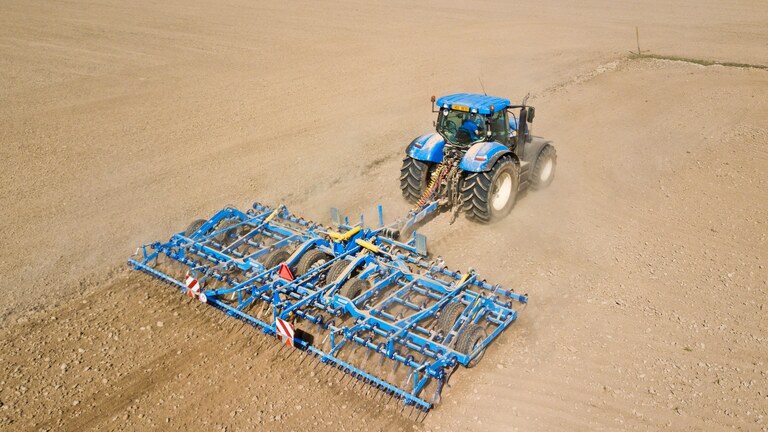He grows poppies, which he has been working on for over 15 years and he is very successful. Lots also corn, oats green, triticale or rye green, oats mixed with peas and grass, all for the biogas station he operates. Other crops he grows in his fields are rapeseed and wheat. It successfully uses slurry or digestate as a fertilizer. He employs four other workers.
Mr. Jiránek bought an eight-meter Verso coulter cultivator four years ago. The machine is used effectively in spring and autumn. The machine prepares land for spring sowing very early in the spring, often at a time when the soil is still very wet. Especially with poppies, it sometimes needs to sow very early in the spring and needs to prepare the soil quickly.
On April 6, 2020, we caught Mr. Jiránek in the field preparing the ground for sowing poppies. While in the neighboring field at the same time they were preparing the Farmet Kompaktomat seedbed for sugar beet, Mr. Jiránek chooses Verso.
The Verso easily cultivates a surface that dries easily. This makes it easy to sow, but the soil in the lower layer remains wet, and this is beneficial for seed germination. After processing Versem, it is usually sown that day or the next. This procedure of establishing vegetation has proved very useful to him. This year's poppy crops have grown beautifully and the fully involved field with healthy poppy plants is now a promise of high yields.
The soil conditions of the region are mainly heavy soils and Verso will cope perfectly. Compared to a competing machine, which also owns a similar one, it appreciates a stronger, more massive frame, a heavier machine that can maintain depth and perfectly level the field. He highly praises the hydraulically controlled shears and depth. He also tried exchanging chisels for wider coulters, the land is then more loose and the lumps are better fragmented. However, the tensile strength increases again. Usually, the Verso aggregates with a 240-horsepower tractor, but if he has a free 300-horsepower tractor, it prefers one. He considers the optimal driving speed to be at least 10 km / h.
In the classical approach of cultivation technology, for example, wheat treats the soil with a double stubble (first shallower, then deeper) followed by classical plowing, plowing with Versem, sowing and several sprays during vegetation (fertilization, fungicidal protection).
After Verso, he also bought a Digger from Farmet. A machine for deep loosening up to 50 cm, which can effectively mix plant residues into the soil. He will most often use Digger to loosen areas on headlands. It also loosens compacted areas on the land after tracks of tractors or after applying slurry or digestate. Digger also used the deep cultivator as a substitute for plowing, when it was a very dry year, the soil was very compact and hard. It was necessary to disturb the top layer of soil, on dry sandy lands it was almost impossible to plow. He deepened with Digger to 25 cm together with the incorporation of the applied digestate. When working, the machines greatly appreciate that it is possible to lift one row of chisels separately as needed. The star-shaped roller crushes lumps perfectly.
To secure spare parts, it uses its location near Farmet and picks up spare parts directly at Farmet's headquarters in Česká Skalice. The Verso and Digger are serviced by standard routine maintenance. At Verso, he tested both armored chisels and reinforced with carbide plates.
